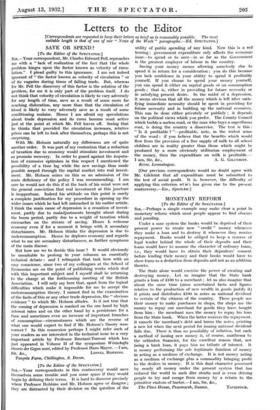MONETARY REFORM
[To the Editor of the SPECTATOR.]
Sin,—Perhaps a simple example may make clear a point in monetary reform which most people appear to find obscure and puzzling.
Under a sane system the banks would be deprived of their present power to create new " credit " money whenever they make a loan and to destroy it whenever they receive repayment. Banks would be obliged to keep a reserve of legal tender behind the whole of their deposits and their loans would have to assume the character of ordinary loans, i.e., they would have to obtain their depositors' consent before lending their money and their books would have to show loans as a deduction from deposits and not as an addition thereto.
The State alone would exercise the power of creating and destroying money. Let us imagine that the State bank grants a loan of £100 to a merchant ; let us also imagine that about the same time (since ascertained facts and figures relative to the production of new wealth in goods justify it) it prints and distributes £100 in notes as national dividend to certain of the citizens of the country. These people use their money to make purchases in shops, the shops use the money to repay our merchant for goods they have bought from him : the merchant uses the money to repay his loan from the State bank. When the latter receives the repayment, it cancels the merchant's debt and burns the notes, printing a new lot when the next period for issuing national dividend falls due. There is thus no possibility of inflation, but such a method of issuing new money is, of course, anathema to the orthodox financier, for the excellent reason that, not being a bank loan, it pays him no tribute of interest. It is money performing the sole legitimate function of money in acting as a medium of exchange. It is not money acting as a medium of exchange plus a commodity bringing profit to the dealers in money. It is this dual character possessed by nearly all money under the present system that has reduced the world to such dire straits and is even driving people to try and escape from money by a return to the primitive custom of barter.—I am, Sir, itre.,
The Place House, Peasmarsh, Sussex.. TAVISTOCK.






























 Previous page
Previous page